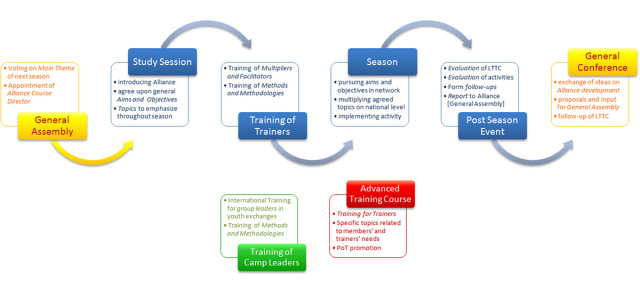Long Term Training Course
The Alliance Long Term Training Course is a practice that was gradually developed in the network since 2012, passed through the adoption by the General Assembly 2013 with the Training and Education policy paper, and is fully implemented for the first time in 2015.
The Alliance Long-Term Training Course (LTTC) takes place during a longer period of time every two years and consists of several educational activities. It aims to link several Alliance (training) events in order to foster the development of Alliance trainers who are able to facilitate preassigned priorities of the network and to address current needs of its members. LTTC targets capable active members of Alliance’ member organizations in order to ensure quality and sustainability of Alliance (training) events.
The biannual LTTC consists of several progressive stages, such as an initial seminar (replacing the previous Study Session), a training of trainers (replacing the previous Training of Trainers) and a final evaluation event (replacing the previous Post Season/Camp Event). Each of them focuses on different segments of the main theme and using different educational approaches.
The initial seminar marks the beginning of the biannual LTTC: participants already commit themselves to participate actively in Alliance, its LTTC and the upcoming season. They will be informed about Alliance, its values and the upcoming LTTC events. They will work on concrete transaction of the main theme to feed the training of trainers and enable a successful practice phase during the workcamp season and its preparation. Afterwards, the final evaluation event aims to evaluate the implementation of preassigned aims and objectives from the previous two meetings as well as the practice phase. The participants of the event are also supposed to produce recommendations and suggestions for follow-up as well as to report findings and results to Alliance bodies. Due to its double aim, this final event should provide enough space to enable on one side the final step of LTTC, and on the other side the evaluation of the workcamp season.
Generally Long-Term Training Course (LTTC) aims to develop facilitators’ competences in the design, implementation and evaluation of Non Formal Education activities in order to improve the quality of Alliance events on every level of the network by establishing high quality standards. By that, LTTC affects the Alliance Pool of Trainers (A-PoT) twice: being a recruitment instrument for the A-PoT itself as well as an instrument for personal and professional development of its members.
Information about the past individual events (Study Session, Training for Trainers and Post Camp Event) and about the biannual LTTCs can be found in the submenu on the left

